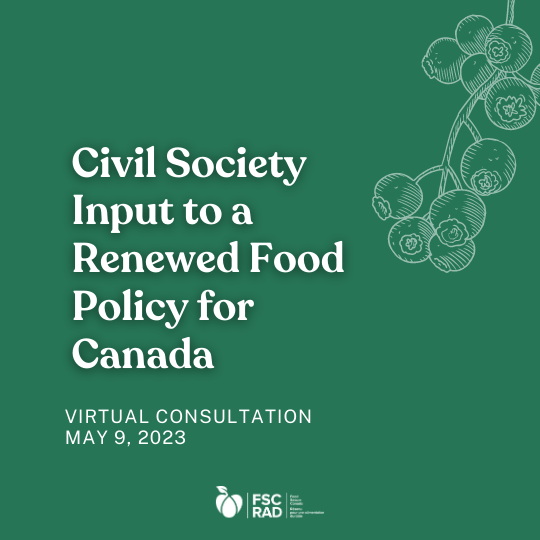By Marissa Alexander and Wade Thorhaug, Co-Executive Directors, Food Secure Canada
Written for The Hill Times and published on May 6th, 2024
When the Finance Minister tabled her budget on April 16th, Canadians were hoping for measures that would address our crisis in food insecurity. In 2023, 8.7 million people – including over 1 in 4 children – experienced food insecurity. These are the highest recorded rates since Canada began monitoring. The pattern of hunger also reflects Canada’s ongoing colonialism and structural racism, with astounding percentages of people living with food insecurity among Black (40.4%), Indigenous (36.8%) and Latin American (31.1%) households. These figures do not include people living on First Nation reserves, in some remote Northern areas, or unhoused people – groups at high risk of food insecurity. Canada needs to do much better.
Budget 2024 strengthens the social safety net in critical ways, including funding the important National School Food Program. Yet, it does not centre measures to ensure food affordability, a key aspect of food security. If this government is serious about food affordability, it needs to take a three-pronged approach. First, address poverty: The primary reason people do not have reliable access to sufficient, healthy, and culturally-appropriate food is because they do not have the money. Going forward, budgets need to include robust, reliable income supports. There are concrete proposals on the table including: implementing and adequately funding working age supplements, disability and housing benefits, comprehensive EI reform, livable minimum wages and basic income.
Fundamentally, income supports need to be measured against Canada’s obligation to fulfill the right to food. And specific and clear targets are essential: the Canadian Food Policy Advisory Council and food security organizations have called on the government to commit to reducing overall food insecurity by 50%, and to entirely eliminate severe food insecurity by 2030.
Second, the government needs to strengthen efforts to rein in unconscionable corporate profiteering, with Budget 2024 very light on new measures. According to the Competition Bureau of Canada, in 2022, Canada’s three largest grocers—Loblaws, Sobeys, and Metro—collectively earned $3.6 billion in profits. And, since the pandemic, their profits have increased by 46%. Shrinkflation (cutting quantities but not price) and skimpflation (cutting quality of ingredients) are just some corporate tactics used to boost profits. Further scrutiny and legislation is needed.
The Office of Consumer Affairs study that underlined the critical lack of competition in the grocery sector was a step in the right direction. But it was significantly hampered by an inability to force corporations to hand over details on pricing, and a lack of requirement for action on recommendations. Parliamentary hearings on high food prices that compelled grocery store CEOs to testify were also useful contributions. These included much memed testimony from Loblaws CEO (total compensation in 2022: $11.7 million) decrying “our profits don’t go to me” – but those hearings similarly lacked any teeth. The result? A ‘voluntary’ code of conduct for grocery stores that not even all of them agreed to follow.
Robust and bold action that releases Canadians from the stranglehold of the Big Food mega corporations is needed – including enforceable grocery codes of conduct and anti-merger policies, favouring the flourishing of small, independent food retailers. Immediate ‘windfall’ taxation should be used to fund a more fair, diverse retail and food provisioning landscape.
Third, government plans should include significant investment in (w)holistic approaches (encompassing justice, resilience and ecological sustainability aspects, as well as economic). Not everyone gets their food from large corporations. Indigenous foodways including hunting, fishing, and gathering have been a foundation of food, culture, and community since time immemorial – yet are increasingly under pressure. Action is needed to fulfill treaty rights, and provide support and recognition for self-directed First Nations, Inuit, and Metis food sovereignty initiatives. Meanwhile, local and regional food marketing mechanisms like food co-oops, direct farm sales, community-supported agriculture and fisheries, farmers markets and the provision of local food to local shops are offering consumers alternatives to large grocery stores, and building long-term resilience and sustainability.
To ensure food affordability, investment is needed in all three areas: guaranteeing adequate incomes, reigning in and redirecting corporate profits, and supporting (w)holistic approaches to food provisioning. Budget 2024 was a missed opportunity. We are counting on the government to take bold and comprehensive steps going forward.

